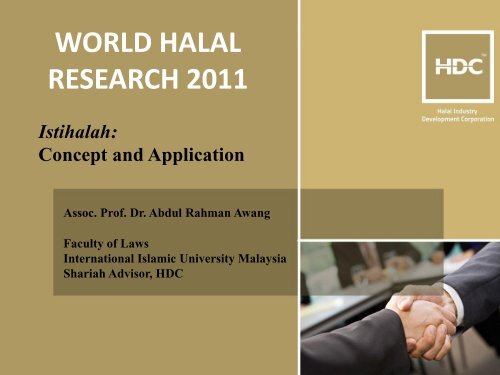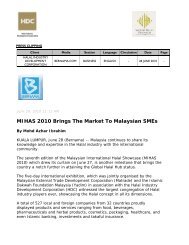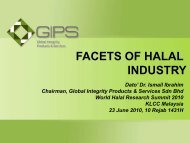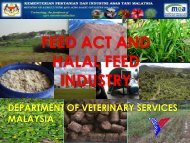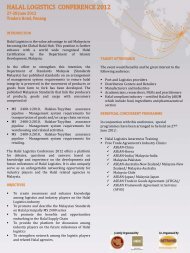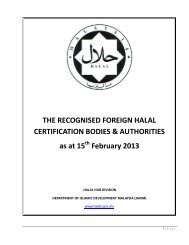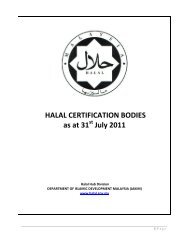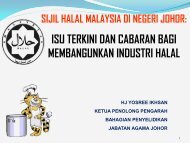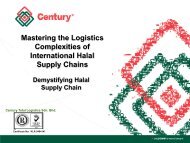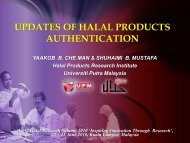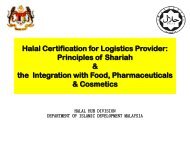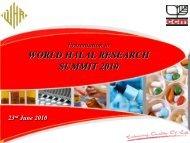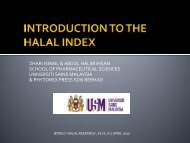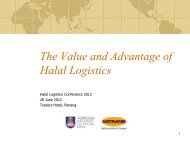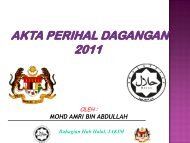Istihalah - Halal Industry Development Corporation
Istihalah - Halal Industry Development Corporation
Istihalah - Halal Industry Development Corporation
You also want an ePaper? Increase the reach of your titles
YUMPU automatically turns print PDFs into web optimized ePapers that Google loves.
TM<br />
WORLD HALAL<br />
TM<br />
RESEARCH 2011<br />
<strong>Istihalah</strong>:<br />
Concept and Application<br />
Assoc. Prof. Dr. Abdul Rahman Awang<br />
Faculty of Laws<br />
International Islamic University Malaysia<br />
Shariah Advisor, HDC
TM<br />
Introduction<br />
• A general rules in Islamic law held that, purity is the<br />
foundation of all matters (things) until the opposite is proved.<br />
• as an exception to the general rule, impure or prohibited<br />
materials can become pure and permitted to use if its<br />
substance is changed into another material different from its<br />
original in name, characteristics and qualities.<br />
2
TM<br />
Introduction (cont’d)<br />
• There are two popular views of the Muslim jurists as for the<br />
application of <strong>Istihalah</strong>.<br />
• Abu Hanifah and his disciple Muhammad al-Shaybani held<br />
that it has become pure hence permissible.<br />
• The second view, on the other hand, held that even when<br />
something impure is changed in its character and transformed<br />
in its nature and elements, it shall continue to be impure.<br />
Thus, it is impermissible.<br />
3
TM<br />
Definition<br />
• literally, it can be defined as to change and to transform<br />
something from its nature and characteristics.<br />
• Technically, concept of <strong>Istihalah</strong> can be defined from two<br />
perspectives i.e. from the perspective of jurisprudence<br />
scholars (usuliyyun) and from the perspective of jurists<br />
(fuqaha ).<br />
4
TM<br />
Definition (cont’d)<br />
• The usuliyyun had defined <strong>Istihalah</strong> as abstaining something<br />
from occurring. Whereas the fuqaha had viewed <strong>Istihalah</strong> as<br />
changes in the true state of something by way of loosing part<br />
or the whole of its original forms.<br />
• The Islamic Organisation for Medical Sciences (IOMS) in the<br />
9th Fiqh-Medical Seminar had adopted the definition of<br />
<strong>Istihalah</strong> as changing the nature of the defiled or forbidden<br />
substance to produce a different substance in names,<br />
properties and characteristics.<br />
5
TM<br />
Definition (cont’d)<br />
• <strong>Istihalah</strong> could happen in two ways either through natural or<br />
through the man made process.<br />
• <strong>Istihalah</strong> could happen naturally without any intervention by<br />
human such as transformation of alcohol to vinegar.<br />
• It also took place by human effort.<br />
• This transformation occurs when a substance is dropped into<br />
another substance such as a drop of onion or bread or yeast or<br />
stone in alcohol.<br />
• It also could occur when a substance such as alcohol is<br />
removed from a sheltered place to an opened place and<br />
exposed to the sun or vice versa.<br />
6
TM<br />
Legality of <strong>Istihalah</strong><br />
• The scholars have differed on the status of <strong>Istihalah</strong> as to<br />
whether or not it can be used for the purpose of consumption<br />
by the Muslims, such as something impure (najasah) if<br />
transformed in its essence, into two views.<br />
• The first view held that it has become pure hence permissible.<br />
7
TM<br />
Legality of <strong>Istihalah</strong><br />
• This view was based on the following authorities:<br />
a) The law had prescribed that something is impure due to its<br />
dirty attribute;<br />
b) An analogy of <strong>Istihalah</strong> of the impure with purification of<br />
the carrion skin by way of tanning;<br />
c) An analogy could be held between <strong>Istihalah</strong> of the impure<br />
substance with the <strong>Istihalah</strong> of alcohol by itself with the<br />
common alteration and changes of the two things:<br />
8
TM<br />
Legality of <strong>Istihalah</strong><br />
• An analogy could also be held between <strong>Istihalah</strong> of the<br />
impure substance with a halal animals when it is feed with<br />
something impure; and<br />
• It is observed that Allah S.W.T changes all His existing<br />
creations and replaces His original creation with new creation<br />
such as alcohol with vinegar etc.<br />
9
TM<br />
Legality of <strong>Istihalah</strong><br />
• The second view, on the other hand, held that even when<br />
something impure is changed in its character and had<br />
transformed in its nature and elements, it shall continue to be<br />
impure.<br />
• Their arguments are as follows:<br />
a) The Prophet (PBUH) prohibited eating Jallalah and its<br />
milk.<br />
b) Transformation as a result of <strong>Istihalah</strong> of the impure<br />
substance, is a partial transformation as it happens to the<br />
attribute of the substance only whereas the essence which is<br />
impure still exists.<br />
10
TM<br />
Legality of <strong>Istihalah</strong><br />
c) The impure substance will never become pure by way of<br />
transformation such as blood when become pus except in the<br />
case of Prophet (PBUH) allows the consumption of spleen and<br />
liver.<br />
• It seems that the view of the majority jurists is more<br />
preferable.<br />
11
TM<br />
Legality of <strong>Istihalah</strong><br />
• A contemporary view on this issue had been given by the<br />
Islamic Organisation for Medical Sciences (IOMS) in their<br />
9th Fiqh-Medical Seminar, held in June 1997 that additive<br />
compounds extracted from prohibited animals or defiled<br />
substances which are transformed, may be considered as<br />
clean and permissible for consumption or as medicine.<br />
12
TM<br />
Issues Related to <strong>Istihalah</strong><br />
1. Alcohol<br />
• It had been agreed by all jurists from all schools of Islamic<br />
law that alcohol whenever changed naturally, without any<br />
chemical treatment, becomes pure and permissible for<br />
consumption and usage.<br />
• This is based on several authorities:<br />
a, Hadith narrated by Aishah (RA) that the Prophet (PBUH)<br />
once said: “The best of condiment(s) is vinegar”;<br />
13
TM<br />
Issues Related to <strong>Istihalah</strong><br />
b, Hadith narrated by Abu Sufyan from Jabir b. 'Abdullah<br />
reported that the Prophet (PBUH) asked his family for<br />
condiment. They (the members of his household) said: We<br />
have nothing with us but vinegar. He asked for it, he began<br />
to eat it, and then said: Vinegar is a good condiment,<br />
vinegar is a good condiment.<br />
14
TM<br />
Issues Related to <strong>Istihalah</strong><br />
• As for transformation of alcohol by way of human<br />
intervention, the jurists differed into two opinions:<br />
1. It is permitted to transform alcohol and if the alcohol is<br />
transformed, then it becomes permissible and pure.<br />
15
TM<br />
Issues Related to <strong>Istihalah</strong><br />
• This view has been supported by several authorities, among<br />
others:<br />
a). It was narrated by Aishah (RA) that the Prophet (PBUH)<br />
once said: “The best of condiment or condiments is vinegar.”<br />
A quite similar Tradition was narrated by Jabir bin Abdullah<br />
who had heard the Prophet (PBUH) asking his family for<br />
condiment. The members of his household said that they had<br />
nothing but vinegar. He asked for it, began to eat it and said:<br />
“Vinegar is a good condiment, vinegar is a good condiment”<br />
Muslim, Hadith No. 5091.<br />
16
TM<br />
Issues Related to <strong>Istihalah</strong><br />
b). It was narrated by Ummu Salamah (RA) that: We used to<br />
have a goat and it dies. The Prophet (PBUH) then asked:<br />
Why did not you make use of its skin. We answered: It is<br />
carrion. He said: “It is permissible by tanning as vinegar<br />
permit alcohol”.<br />
c). Ibn Abbas reported: the Prophet (PBUH) happened to<br />
pass by a dead goat which had been given to the servant of<br />
Maimunah (RA) as charity. Upon this the Prophet (PBUH)<br />
said: Why did not you use its skin They said it was carrion.<br />
He said: The prohibition was to consume its flesh.<br />
17
TM<br />
Issues Related to <strong>Istihalah</strong><br />
2. The majority of the jurists held that it is prohibited to<br />
transform the alcohol, regardless whether it is removed from<br />
a shadowed to an open place or vice versa or by adding some<br />
elements into it.<br />
• This view is based on several authorities:<br />
a). It had been narrated by Anas that the Prophet (PBUH) was<br />
asked about the wine from which vinegar is prepared. He<br />
said: No (it is prohibited).<br />
18
TM<br />
Issues Related to <strong>Istihalah</strong><br />
b). An-Nu'man ibn Bashir narrated that Anas b. Malik said:<br />
Abu Talhah asked the Prophet (PBUH) about the orphans<br />
who had inherited wine. He replied to pour it. Then Abu<br />
Talhah ask the Prophet (PBUH) again: May I make<br />
vinegar out of it He replied: No.<br />
c). Anas bin Malik reported that: I was standing amongst the<br />
uncles of my tribe serving them Fadikh when I was the<br />
youngest among them. A person came and said: “Verily<br />
liquor was prohibited”. They said: Anas! Spill it away, so I<br />
spill it.<br />
19
TM<br />
Issues Related to <strong>Istihalah</strong><br />
• The National Fatwa Council of Malaysia (4 th April, 2006)<br />
agreed with the view of the majority and decided that it is<br />
prohibited to use wine vinegar which is processed and added<br />
with other ingredients. However, if such transformation from<br />
wine vinegar to vinegar happens by itself, then it is<br />
permissible.<br />
20
TM<br />
Issues Related to <strong>Istihalah</strong><br />
2. Usage Of Lard In Food Processing<br />
• Any food that had been added with lard during its processing<br />
is prohibited.<br />
• It is also prohibited to eat anything that had been cooked or<br />
fried with lard except if the form of the lard had changed and<br />
transformed into something else which is totally different.<br />
21
TM<br />
Issues Related to <strong>Istihalah</strong><br />
• 8 th Fiqh-Medical Seminar organized by International<br />
Organisation for Medical Sciences stated that:<br />
• “Foodstuff containing pig fat which does not undergo<br />
denaturation, such as some varieties of cheese, vegetable oil,<br />
skin oil/lubricant, butter, cream, biscuit chocolate and icecream,<br />
are prohibited. Obviously, some situation warrants an<br />
exception due to „necessity‟ (dharurah)”.<br />
22
TM<br />
Issues Related to <strong>Istihalah</strong><br />
3. Gelatine Produced from Swine<br />
• Chemist and pharmacist had agreed that gelatine derived<br />
from porcine, bovine or other animals had undergone<br />
transformation (<strong>Istihalah</strong>) as recognized by the Islamic law<br />
where their skins and bones which are prohibited and impure<br />
had changed into other substance.<br />
23
TM<br />
Issues Related to <strong>Istihalah</strong><br />
• Moreover, the transformed substance had changed into<br />
something different from its original substance in term of<br />
form, taste, smell, chemical structure and other physical<br />
criteria.<br />
24
TM<br />
Issues Related to <strong>Istihalah</strong><br />
• It could be concluded that gelatine derived from those<br />
prohibited and impure materials such as swine or carrions are<br />
pure and could be consumed, according to the discussion of<br />
some Muslim jurists, based on the concept of <strong>Istihalah</strong>.<br />
• This is due to the fact that the substance and characteristic of<br />
the skin and bone of swine and carrion had no longer existed.<br />
• Therefore, gelatine or the likes after its transformation no<br />
longer described as prohibition since its original attributes<br />
had ceased to exist.<br />
25
TM<br />
Issues Related to <strong>Istihalah</strong><br />
• The 8th Fiqh-Medical Seminar organized by International<br />
Organisation for Medical Sciences stated that:<br />
“Transformation, i.e. the process that causes an object to<br />
change into another, totally different in properties and<br />
characters, turns the unclean, or what is deemed to be<br />
unclean, into a clean object, and therefore turns prohibited<br />
things into things permissible by the Shariah. On this<br />
account the following is concluded: … Gelatine made of<br />
unclean animal's bones, skin and tendons is clean and<br />
permissible for consumption.”<br />
26
TM<br />
Issues Related to <strong>Istihalah</strong><br />
4. Application Of Insulin Originated From Swine<br />
• According to the recommendation of the 8 th Fiqh-Medical<br />
Seminar, treatment of diabetes patients with insulin obtained<br />
from a pig source is permissible because of necessity in<br />
accordance with the principle of necessity.<br />
• However, according to Dr Nazih Hammad, such rule of<br />
necessity should not be applied by an application of the<br />
concept of <strong>Istihalah</strong>.<br />
27
TM<br />
Issues Related to <strong>Istihalah</strong><br />
• His argument is that it had been recognized scientifically that<br />
the production of insulin from pork pancreas happen as a<br />
result of a very complicated and various chemical reaction<br />
towards the pork tissue.<br />
• This process had changed the substance and the actual form<br />
of the organ into something new which is totally different<br />
from its origin in term of name, criteria and attribute.<br />
28
TM<br />
Issues Related to <strong>Istihalah</strong><br />
• When there is a transformation in substance of something<br />
impure and prohibited, it becomes pure and permissible<br />
according to the majority view of Muslim jurists.<br />
29
TM<br />
Issues Related to <strong>Istihalah</strong><br />
5. Cosmetics Added with Lard<br />
• If it contained lard or other animal fat which does not change<br />
in its substance as required by the Shariah, shall be deemed<br />
as impure and shall be prohibited except when in the<br />
necessity (darurah) situation.<br />
• However, if it could be ascertain that there is an actual<br />
transformation of the substance as required under the concept<br />
of <strong>Istihalah</strong>, then the materials shall be regarded, to some<br />
jurists and Schools, as pure and permissible.<br />
30
TM<br />
Issues Related to <strong>Istihalah</strong><br />
• The 8 th Fiqh-Medical Seminar organized by International<br />
Organisation for Medical Sciences stated that:<br />
• “Ointments, creams and cosmetics which contain pig fat are<br />
all unclean. Their use is impermissible in Shariah except<br />
when transformation (of the material into one of totally<br />
different properties) is ensured.”<br />
31
TM<br />
Issues Related to <strong>Istihalah</strong><br />
• The National Fatwa Council of Malaysia had decided that<br />
any cosmetic products which contain any impure substance<br />
such as element of animals that are prohibited for<br />
consumption or could cause harm to human being are<br />
prohibited in Islam for consumption.( www.e-fatwa.gov.my).<br />
• Therefore, the application of the concept in this issue is still<br />
unacceptable by the Malaysian authority.<br />
32
TM<br />
Conclusion<br />
• The concept of <strong>Istihalah</strong> is acceptable in Islam and it is the<br />
view of the majority of Muslim jurists.<br />
• However, the application of the concept in the present time<br />
especially with regard to certification of halal product is still<br />
debatable among the Muslim authorities.<br />
• Most of the disagreement on the concept of <strong>Istihalah</strong> is the<br />
usage and the presence of pig and its derivatives in food<br />
processing and other consumer products.<br />
33
TM<br />
Conclusion (cont’d)<br />
• This could be seen from various fatwas endorsed by the<br />
Muftis and the Religious authorities especially in Malaysia,<br />
which is a follower of Shafie school, except in situation of<br />
necessity.<br />
• As we have elaborated and discussed the concept of <strong>Istihalah</strong><br />
above, some supported and agreed over the application of the<br />
concept whereas the others are opposing it.<br />
• However, it depends on the respective authorities of the<br />
individual Muslim countries to decide it.<br />
34
TM<br />
Thank You<br />
35
TM<br />
TM<br />
<strong>Halal</strong> <strong>Industry</strong> <strong>Development</strong> <strong>Corporation</strong> (HDC)<br />
5.02, Level 5,<br />
KPMG Tower, First Avenue, Persiaran Bandar Utama,<br />
47800 Petaling Jaya, Selangor Darul Ehsan,<br />
Malaysia.<br />
Tel : +603 - 7965 5555<br />
Fax : +603 - 7965 5500<br />
Hotline :<br />
Malaysia)<br />
1800 - 880 - 555 (within<br />
+603 7965 5400 (outside Malaysia)<br />
www.hdcglobal.com


